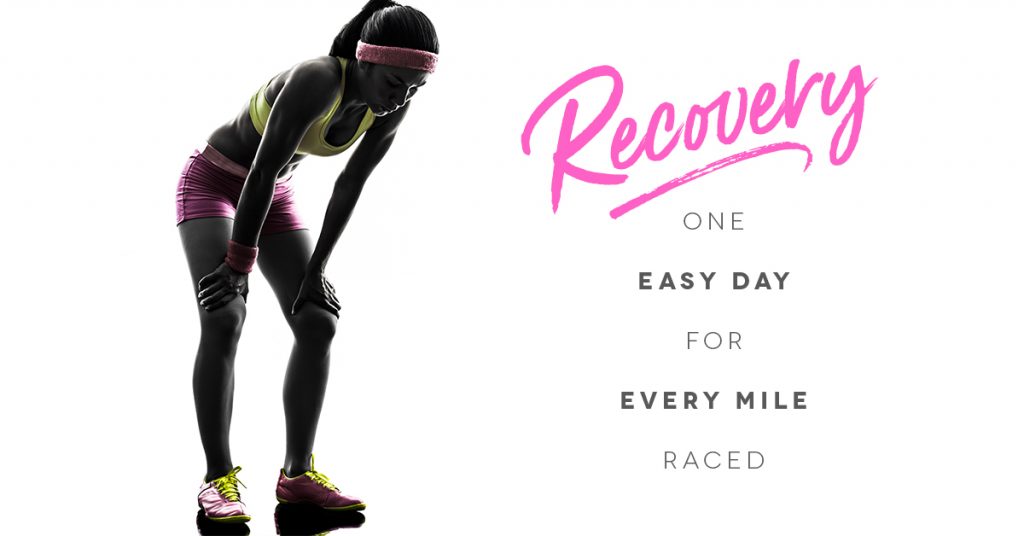To carry on our race recovery theme, the other day I was live on Facbook (see below) sharing tips for bringing your body back from the hell you’ve just thrust it into by racing a half or full marathon. I mentioned the golden rule that for every mile raced you need a day of rest or easy running following it (e.g. marathon = 26 easy days). However, like any rule in running, there are always exceptions.

After my recent half marathon, I took 13 days of either rest, light cross training or easy running (nothing over 70 minutes). For me, those 13 days weren’t quite enough, for others it can be plenty. To explain these differences, here are SIX key exceptions to the miles raced/days recovering rule:
1 | How hard did you race?
One marathon that I actually won, I backed up with two races in the space of 13 days. I could do this because I ran the marathon at a speed that wasn’t too demanding—it felt more like ultra marathon pace on the day. But when I’ve really tried to push the limits in a marathon, I’ve been nailed for 4-6 weeks, only really feeling like my old self two months later!
Tip: When you’re working out how many easy days you need after your race, reflect on how those last 5k of your race felt. Were you deep in the hurt locker? Or were you high-fiving people and chatting away?
2 | How hard was the course?
The course makes a huge difference to how your body bounces back. I find undulating trails the easiest on the body, then flat or mostly uphill courses, and finally courses with large amounts of downhill are the nastiest.
You might expect the uphills to be worse, but the increased impact and the speeds you can achieve downhill mean that the wear and tear shifts from a question of aerobic fitness and endurance to one of strength and muscular balances. It’s often the quads that take the lion’s share of the work running downhill, and locked up quads can lead to all sorts of issues, particularly with the knees and hips. And if you return to running too soon, these weakened areas can encourage some compensation, often flaring up old injuries.
Tip: Consider how your body has bounced back from racing different courses. It’s often the terrain that we train on the least that our bodies get beat up the most when racing.
3 | How have you recovered?
I ran the Chicago Marathon. I finished, but quickly find myself in the medic tent with five medical staff (I kid you not, the service was amazing!) attending to me with massage, stretching, recovery drinks and pretzels, and eventually a couple of saline bags via IV. The next day I felt amazing!
My wife was another story.
She ran the same marathon and obviously couldn’t find me in the huge finish area as I was already on my way to the hospital. Not knowing where I was, and neither of us having phones on us, she spent her valuable recovery time looking for me (bless her!), missing out on a post-race massage, not having enough food and fluid and doing too much walking. Poor thing, she was nailed for weeks.
Tip: A) Shout your wife to a day spa or three if this ever happens to your partner! B) Understand that the four hours immediately after the race (electrolyte and fluid replacement, massage, and protein) and the 48 hours after that (gentle regular movement, more massage, good food, sleep and rest) are the most critical recovery periods for enjoying intentional recovery.
4 | How old are you?
For every five years over 30, I’d add another day to your recovery, at least. But this is also impacted by your training age.
If you’re 35 and you’ve trained like an animal since you were 15. Chances are you’ll need a little more time than someone who got started running when they were 30. On there other hand, the opposite can be true. If you’re a new runner, and didn’t do much weight-bearing activity as a teenager, you could be at a huge risk of stress fractures. So, your lower training age (and, with it, lower bone density) could mean you actually need more time off after your race as a result.
Tip: If you’re over 30, be careful. If you’ve been training for decades, be careful. If you’re new to running, be careful. So … um … I think I’m saying … everyone should be careful.
5 | How is your general health?
I mentioned before about bone density, our bodies can have all sorts of pre-dispositons that can slow up our recovery cycle for what ever reason. I’ve got a sinus issue that restricts my breathing and often flares up in the week or two following a key race. The tougher breathing, means my body is working harder, and takes longer to recover. It’s something I’m always having to balance.
For you it might be low iron, higher BMI (and equally, too low BMI), asthma, lack of sleep, poor flexibility, muscular imbalances or the fact you had a flu going into the race … the list goes on.
Tip: Understand your body’s weak points and talk to your sports medical professional who will be able to explain how those weak points might impact your recovery.
6 | How was your training?
The way to have a terrible marathon experience and take forever to recover is to not train for it.
Don’t do that.
When you train well for a half or full marathon, the distance of the event is no longer much of a challenge—you might run almost a marathon every weekend. Therefore, often, the runner who trains well for their marathon bounces back much faster than others—that is unless they really go after it and take up the challenge to hit a new PB or certain placing.
Tip: If you train well, you should recover well.
Know someone who has just finished their half or full marathon? Flick them this article to help them make the right choices about getting back into training.
Happy running and recovering!



